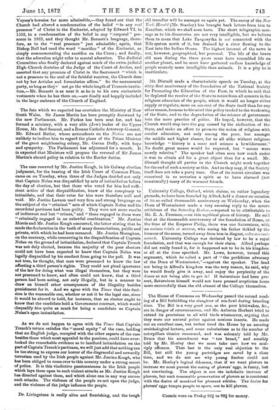The House of Commons on Wednesday passed the second read-
ing of a Bill forbidding the slaughter of sea-fowl during breeding time. The Bill is a very good one, as the poor kittiwakes, &c., are in danger of extermination, and Mr. Auberon Herbert tried to extend its provisions to all wild birds whatsoever, arguing that they were our natural police against noxious insects. He made out an excellent case, but rather tired the House by an amusing ornithological lecture, and some calculations as to the number of caterpillars titmice consumed, and was solemnly told by Mr.
Bruce that his amendment was too broad," and sensibly told by Mr. Henley that we must take care how we mul- tiply offences. That last is the only real objection to the Bill, but still the young partridges are saved by a close time, and we do not see why young finches could not be. Mr. Henley's logical dilemma, that if we want plovers to increase we must punish the eating of plovers' eggs, is funny, but not convincing. The object is not the indefinite increase of plovers, but such reasonable preservation of plovers as is consistent with the desire of mankind for pleasant edibles. The desire for plovers' eggs tempts people to spare, not to kill plovers.


































 Previous page
Previous page